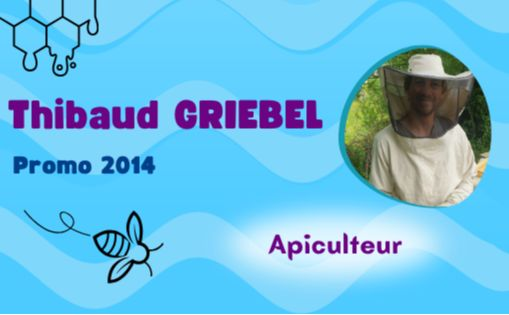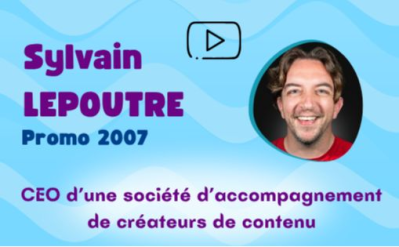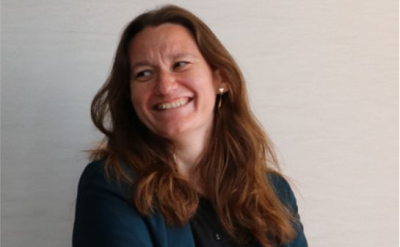News

Atypical career paths: Alumni who think outside the box - N°X - Thibaud GRIEBEL
Title banner with DA to make on Canva

Thibaud Griebel, who graduated in 2014, has charted an unusual path, but one that's deeply in tune with his values and love of nature, from production manager to beekeeper involved in a collective farm project near Grenoble.
His atypical career path, between a break in South America, production management and agricultural reconversion, shows that it's always possible to redefine one's path.
Who are you?
"Thibaud Griebel, I'm 35, I graduated in 2014 and I'm passionate about the mountains. I've done a lot of skiing, a bit of climbing, a bit of paragliding and currently I'm a beekeeper and in the process of setting up a collective farm. We're going to do market gardening and beekeeping around Grenoble."

Your career at GSI
Thibaud came to ENSGSI in his first year as an engineer and took a gap year between his second and third years, during which he spent 8 months woofing in South America. He left with the desire to discover the world, to open up and get away from his daily routine. He explains: "It gave me self-confidence and enabled me to learn Spanish and open up to another culture, another way of doing things. Latin people are much more friendly and that's something new for me, which I really appreciated. And the fact of being on my own also gave me confidence in myself, in what I wanted to do. That's where the reconversion project came from, it made me question what I really wanted to do, on my own, without any external constraints."
Thibaud initially chose to come to ENSGSI because he was aiming for a career in industry. The interview he went through to get in strongly attracted him to the school, as he was asked to build something as part of a group and was observed doing so. It was this aspect of the school, with people at its heart, that made him want to go.
And after graduation?

What was your career path right after GSI?
"I did a 6-month internship as aproduction engineer in the Vosges and followed this up with a 6-month fixed-term contract where the idea was to start up a polyester recycling production plant. The idea was to start up a polyester recycling production plant. It was a manufacturing mine that had arrived from China, and we had to set it up in an empty factory to try and get the machines up and running. Unfortunately, things didn't go so well that at the end of the 6-month fixed-term contract, the plant went out of business, so to speak.
Then I moved on to another job, still in production, but this time in Grenoble. I was in charge of a production team, initially at night, at a company called MiniTube, which manufactures small metal tubes for the medical industry, to make catheters, stents... I stayed there until 2020. "
Thibaud's job as a team leader was very rewarding , as he managed a team of between 25 and 30 people in a fast-growing company. His work was practical, dynamic and integrated the human aspect that is so important to him.
"I then did a year's training in 2021, a BPREA, which is an agricultural training course for adults in market gardening until the end of 2021. And then, from 2022 until today, I started beekeeping on my own, on my own account. And today I'm in the process of setting up a collective farm where there are 4 partners and we do market gardening and beekeeping. Our farm will be called the GAEC (Groupement Agricole d'Exploitation Commun) des Mélilot, near Grenoble.
Although he had always wanted to have a concrete job in contact with nature, the real trigger came in 2020, just after the confinement. Thibaud discovered the world of beekeeping while woofing with a former engineer who was also retraining. Inspired, he decided to take his training seriously.
Did you stop working during the training year? What was it like?
"I benefited from a scheme called Transition Pro, where I remained an employee of my company throughout my training. And at the end of my training, I decided to leave my company and set up my own business. It was very reassuring for me, because it was a new job, with new constraints... So the fact that I remained an employee made the transition more secure, which was a very challenging one."
Your job and your project
What's a typical day like?
"It's very seasonal. From November onwards, the bees don't come out too much, it's too cold and the peak season starts in mid-March. A typical day would be to prepare the equipment in the morning, organize the day, then from 10 or 12 go out to the hives, do the operations that are necessary and then I go from site to site. The days are really varied, between production days, marketing days, trainingdays...
These are highly technical jobs, and I'm making more progress every day. I consider myself a beginner after 3 years of practice, and 3 seasons isn't much in beekeeping to learn how to decode a hive, its behavior and colony dynamics . It's a fabulous world, so the days go by fast. "
Until last year, Thibaud was alone in his activity, although surrounded by people from other farms. Alongside his beginnings in beekeeping, Thibaud imagined from the outset a collective project, so as not to face the ups and downs of the business alone. He has tried a few times since 2022 to launch this project, and today he is associated with people he has met along the way over the past year.

What phase of the project are you currently in?
"We've set up the company and we're going to start cultivating this spring. Right now, we're in the quotation phase, we're going to build our tools, buy the tractor, erect the buildings, all that this year. We're going to do a short year of marketing in 2025, and in 2026 we'll really set up.It's an ambitious, substantial project, with 450,000 euros invested over 4 years. "
What do you like about your current job? What do you like less?
"What I like is the contact with nature and the fact that you have to adapt. Every time we open a hive , it's a surprise to see what's going on, whether everything's fine or whether we need to intervene. What I also like about this job is that it's all-encompassing, no two days are alike, and there's everything to plan. There are production days, there's sales strategy , there's planning : if you want to make a success of your season, you have to anticipate a number of things, the equipment, the dates when you can move hives, the dates when you want to breed queens...".
He then adds that one of the disadvantages of the job is the need to constantly adapt to the weather, which is a source of stress, but which is the beauty of the job. Finally, the solitary aspect of his job didn't coincide with his desire for human contact, but his collective farm project solved this drawback.
Your vision of GSI
Have you used GSI tools and methods during your career? Which ones?
"Precise tools and methods, no, but what I retained from GSI and which is of great benefit to me is the ability to take a step back from situations. We're taught how to pose problems properly and integrate all factors, especially human factors, with collective management and how to treat the problem globally. It's really important and it's helped me throughout my career to have this global vision, to step back, and to be willing to think outside the box. That's one of the school's strengths. "
The basics of project management methodology that he picked up from his years at school were a major asset in setting up the collective farm. In particular, his understanding of how a project evolves, how to draw up financing plans, how to draw up a backward schedule, etc., was a major asset.
Do you think that what you've done in personal development in the MP3 division has helped you to get to know yourself better, especially for your career change?
"Completely, the project was born from there too. It's the fact of questioning who I am, what I want to do, what my values are that came back to me. Working on personal development brought out this idea, this desire to be in contact with nature, to have a project that makes sense."
What advice would you give to future alumni?
"The advice I'd give is to do what they want to do, today, lots of things are possible, reconversions in lots of different ways. And just because you chose one path at the beginning doesn't mean you can't change.
Do what you want to do, in any field, there are lots of things, in engineering or in anything else. There's something for everyone, I think.
A final word?
"Life is good! I'm really happy with this conversion and proud of my career path, and I encourage anyone who wants to get into farming or new projects that are good for the planet, it really is a wonderful world. "

















No comment
Log in to post comment. Log in.